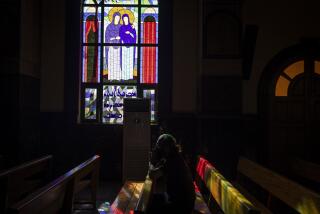Chechen Peace Could Give Way to Clan Warfare
- Share via
GROZNY, Russia — The green, white and red flag of the self-proclaimed Chechen Republic flutters from battered patrol cars and what is left of official buildings here in the capital, leaving little doubt that the 20-month war waged by the once-mighty Russian army has been won by the grossly outnumbered rebels.
But as federal troops wrapped up their retreat Tuesday and a 4-day-old peace accord was taking surprisingly strong hold, the Chechens’ moral victory was already being undermined by their legendary penchant for fighting among themselves.
Without a unifying cause--resisting their mutual Russian enemies--the factions that clashed for power long before Moscow’s troops rolled in here have quickly resumed their neglected conflicts.
Across this shattered southern Russian region, divided by broken trust and shifting alliances, many now fear they face the same fate of clan warfare that has gripped Afghanistan since the Soviet Union’s 1989 withdrawal.
“Everyone wants peace after so much bloodshed, but it must be said that those who were involved in the illegal government that was planted here by Moscow will probably try to destroy the agreement,” Akhmed Zakayev, security advisor to Chechen rebel leader Zelimkhan A. Yanderbiyev, said of the truce signed Saturday. It proclaims an end to the war and postpones the crucial issue of Chechen independence.
Zakayev was alluding to Chechen political figures who either opposed the separatist aims of Yanderbiyev’s predecessor, Dzhokar M. Dudayev, or simply sought to stay out of the devastating conflict by tolerating Moscow’s puppet rulers.
In fruitless attempts to enhance opposition to the charismatic Dudayev--and in hopes of installing pliable Chechen negotiating partners--the Kremlin elevated a succession of pro-Moscow figures. No viable deal was ever struck with the distrusted separatist opposition, but the political meddling has inflated what once were differences of opinion into vitriolic accusations of treason.
Dudayev was reported to have been killed in a Russian air raid in April. But the success of his followers in retaking this ruined capital and forcing the bulk of Russian troops out of the republic has made pariahs of those public officials who failed to join the independence cause.
“No one talks to us now! Our opinions mean nothing!” fumed Takha Churchayev, mayor of the nearby town of Urus-Martan, in one of several Chechen regions that from the outset opposed Dudayev.
Churchayev was furious over the turnabout by Russian Security Council chief Alexander I. Lebed in negotiating with Dudayev’s separatist successors to craft the latest peace agreement. Since then, the triumphant rebels have moved to oust regional leaders whom they saw as traitors, installing their own loyalists and sowing the seeds of postwar resentment.
“Lebed came here and negotiated this settlement with the very people Moscow had been denouncing as bandits and terrorists, while those of us who remained loyal to Russia were not even consulted,” protested Mukhadin Shimayev, a local television official. “This was done deliberately so that we would begin to destroy each other.”
Doku Zavgayev, the last puppet leader installed by the Kremlin, has fled to Moscow with his most senior deputies. But the lesser loyalists have been left to fend for themselves against the triumphant rebels.
The peace deal struck early Saturday by Lebed and Aslan Maskhadov, the rebel chief of staff, maintains a fiction of joint control of the capital by federal and separatist forces. But the underdog fighters with their green headbands and their bandoleers clearly dominate every street patrol and armed checkpoint.
While spirited rebel fighters stood watch over cars entering Grozny on Tuesday, saluting with clenched fists and Islamic cries in praise of God, dejected federal troops kept themselves at a respectful distance.
At the joint command headquarters set up inside a bombed-out factory, Russian officers huddled behind locked doors while their Chechen counterparts bantered with mediators and journalists. The only troops who could be seen patrolling the blasted buildings of the capital were rebels flying their secessionist flag as they zigzagged through the wreckage.
All but a few hundred Russian troops manning the joint headquarters have withdrawn with their tanks and cannons to positions outside Chechnya’s borders or are decamping from the bases built among the ruins of this city that was once home to 400,000 people.
Cinder-block lookouts the federal forces built over bus stops along Chechnya’s rural roads have been abandoned, and what little federal armor can still be seen is usually in convoys headed for the border.
“We are the victors. This is clear in the fact that Russians are fleeing our territory now,” insisted Khusein Khakhayev, a jubilant city official.
But even those savoring what they consider an undeniable triumph in securing de facto independence conceded the fruits of victory may not last.
“We have a long history of clan rivalries, and this war has only added to the tragedies dividing our people,” said Khakhayev. “This too is Moscow’s doing, but we will pay the price for it.”
More to Read
Sign up for Essential California
The most important California stories and recommendations in your inbox every morning.
You may occasionally receive promotional content from the Los Angeles Times.











